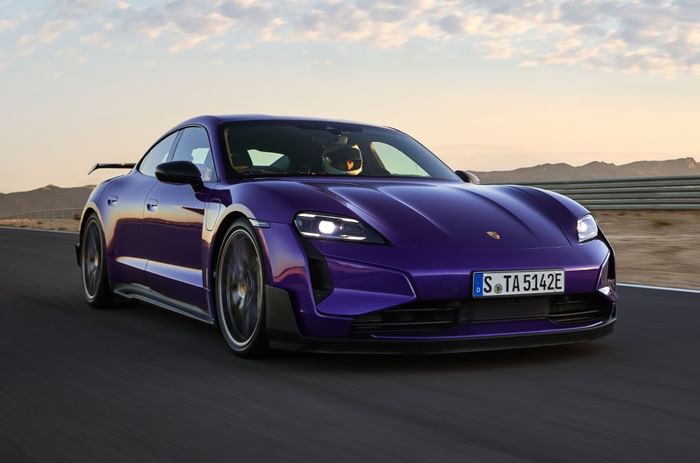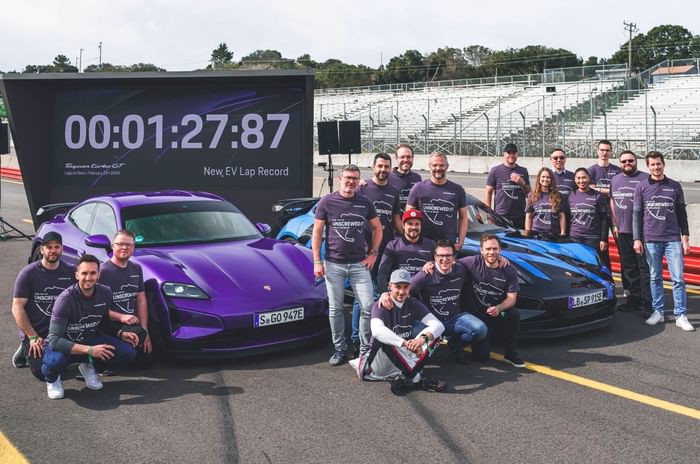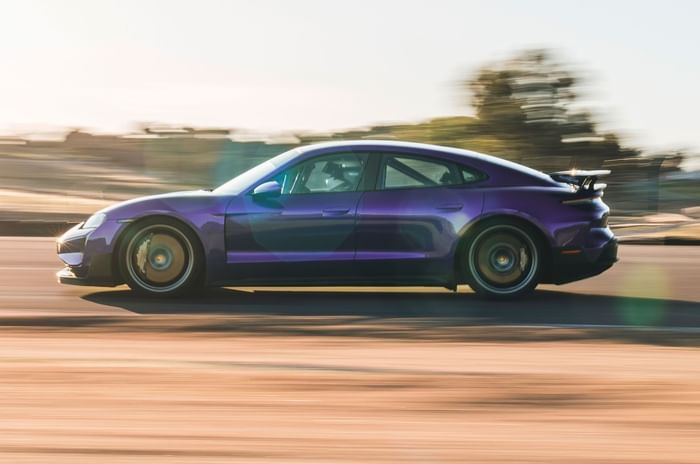The new Porsche Taycan Turbo GT is the brand's most powerful road car yet, and it has already set lap records at two of the world’s most prestigious race tracks – Nurburgring and Leguna Seca. Available as a two seater with an overhauled chassis and powertrain, it is the first electric car from Porsche’s storied GT division and one of the fastest four-door cars on the market.
- Taycan Turbo GT gets 789hp; 1,033hp with Launch Control; 1,108hp boost for 2s
- Taycan Turbo GT weighs 75kg less than Turbo S
- Weissach pack reduces weight by 70kg; acceleration times down by 0.1s
Porsche Taycan Turbo GT performance, powertrain
The GT swaps the recently facelifted Taycan’s rear motor for a unit with a silicon-carbide inverter. This is said to reduce energy losses as the transistors switch on and off, and allow for a greater maximum current of 900A, significantly boosting maximum power. As such, the Turbo GT is capable of putting out up to 1,108hp and 1,340Nm – 74hp more than the tri-motor Tesla Model S Plaid.
It can, according to official tests, sustain maximum power for two seconds at a time using Launch Control and kicks out 789hp in normal operation. The Taycan’s push-to-pass function has also evolved to take advantage of the new motor. It has been recalibrated – and renamed Attack mode – with inspiration from the Porsche 99X Formula E car, providing 1,033hp for 10 seconds at a time. That’s 68hp more than what's offered in other Taycans.
Performance is also bolstered by a 75kg reduction in mass compared with the Taycan Turbo S, which has been achieved through liberal use of carbon fibre – on the B-pillars, door mirror caps and bucket seats, among other areas – as well as the fitment of lightweight 21-inch forged wheels and the removal of the soft-closing boot mechanism. Even the ceramic brakes’ disc chambers and caliper housings have been reworked to shave off 2kg.

The optional Weissach package takes the diet a step further, “eliminating all equipment not required for track driving”. Among the changes are the removal of the rear seats, rear speakers and one of the two charge ports. Also gone are the floor and boot mats, as well as some of the interior sound insulation material. The active rear spoiler is replaced by a fixed carbon-fibre wing and the windows are swapped out for lightweight glass.
These efforts net an extra 70kg reduction compared with the regular Turbo GT, making it the fastest-accelerating Porsche to have hit public roads. It despatches 0-100kph in just 2.2 seconds with the Weissach package, and 2.3 seconds without it. The Turbo GT goes on to a top speed of 290kph with the Weissach package, or 306kph without.
For reference, the Model S Plaid has a claimed 0-96kph time of 1.99 seconds, but Tesla subtracts a one-foot rollout from the timing, meaning the car is already moving before timing begins. Our sister publication Autocar UK’s testing showed that, without the rollout, it took 2.4sec to hit 96kph.
Porsche Taycan Turbo GT lap records
To further improve track performance, the Turbo GT receives specially calibrated Porsche Active Ride suspension, which the marque claims, offers “an almost perfect connection to the road”. With all of these modifications in place, the Turbo GT has decimated the lap record for road-legal electric cars at the fearsome Nurburgring Nordschleife, rounding the 22.7km track in 7min 7.55sec. That is over 25 seconds quicker than the old Turbo S and nearly 18 seconds quicker than the previous record holder, the Model S Plaid Track Pack.

At California’s Laguna Seca raceway, the Turbo GT managed a lap time of 1min 27.87sec, just trailing the 1min 26.75sec set by a Tesla Model S Plaid tuned by Unplugged Performance and running on non-road-legal Yokohama tyres.
Porsche Taycan Turbo GT development
Kevin Giek, who heads development of all Taycan models, told Autocar UK that the Turbo GT was something of a personal passion project, carried out separately from the actual GT division run by Andreas Preuninger. “It was me and my team. I have a Preuninger for myself,” he said, referring to the hundreds of engineers involved in the new Taycan’s creation. “We managed this together. It was my idea to have GT for electric, but it’s our baby.”
This is as extreme as the Taycan can feasibly get, he added: “You could go a bit further if you used race tyres and throw out more weight, but then it’s not street-legal any more.” While the Turbo GT’s acceleration figures and lap times shade nearly every other car that wears a numberplate, Giek is adamant that it remains a true dual-purpose proposition: “You can drive it anywhere you want, but you can also take it on the track.”
Work began in April 2021, only around 18 months after the Taycan was launched and well before the arrival of the facelifted 2024 car, but Giek explained that the Turbo GT could not have been developed using the original Taycan as the basis because its huge power reserves are contingent on the very latest technology.

“It didn’t make sense” to launch it before now, he said: “We introduced loads of new stuff like the silicon carbide converter with 900 amps, so it just made sense with the facelift because that’s where we introduced the technology.” Notably, the GT uses the same 105kWh lithium-ion battery as the standard Taycan, because using a smaller unit in the name of shaving crucial kilograms would have dented its performance potential.
“You need the big battery because you need the power. We couldn’t realise 1,100hp” with a smaller battery, explained Giek. Asked if the reduced weight means the Turbo GT could, in theory, beat the standard car’s 680km maximum range, he would only go so far as to say: “Yes, for sure.” Giek said Porsche has not put this theory to the test, but naturally any boost in range would require the removal of the front motor and a significant downtuning of the rear.
Porsche Taycan Turbo GT price, India details
Prices for the Taycan Turbo GT are almost as much as the 911 GT3 RS sold abroad, and the Weissach package is a no-cost option. The Turbo GT is available to order now in select markets, ahead of deliveries starting in the coming months.
In India, Porsche already sold all versions of the outgoing Taycan – it was on sale in standard, 4S, Turbo, and Turbo S guises – and the facelift is expected to arrive in the near future. In fact, Porsche’s India website has the Taycan facelift listed, though bookings have yet to commence. Whether it’ll also be offered in Turbo GT form is yet unknown.
Also see:
New 536hp Porsche Panamera e-Hybrid gets 95km EV range
Porsche India records highest ever sales of 914 units in 2023
Porsche Macan EV Turbo launched at Rs 1.65 crore







.jpg?w=234&h=156&q=90&c=1)







Comments
Member Login
Personal Details
No comments yet. Be the first to comment.